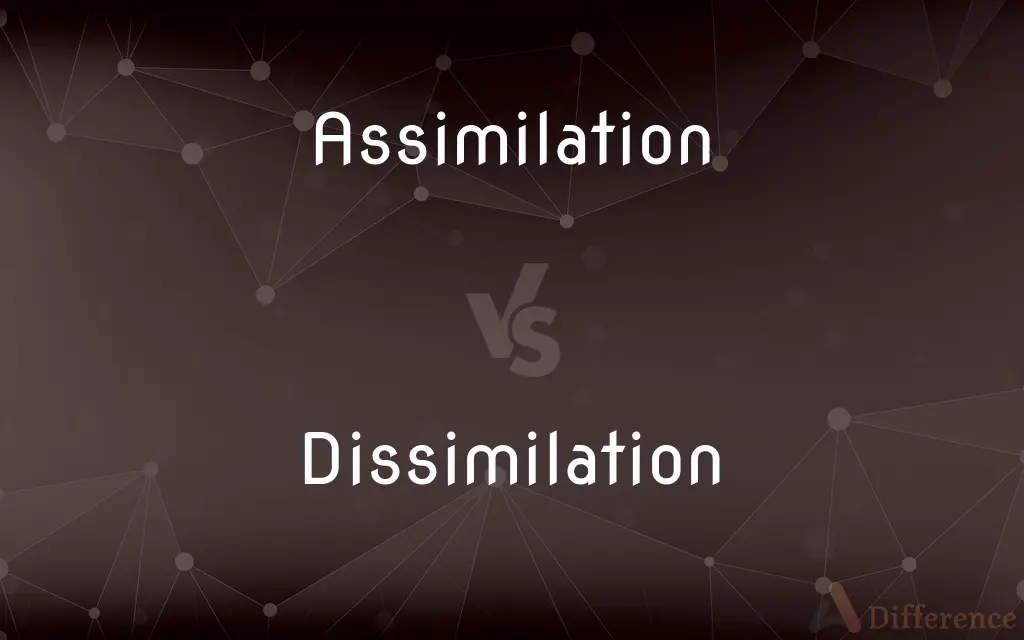Assimilation vs. Dissimilation — What's the Difference?
By Fiza Rafique & Urooj Arif — Updated on March 8, 2024
Assimilation involves sound changes making phonemes more similar, while dissimilation makes them less alike.

Difference Between Assimilation and Dissimilation
Table of Contents
ADVERTISEMENT
Key Differences
Assimilation is a phonological process where sounds become more similar to nearby sounds in a word, enhancing phonetic harmony and ease of pronunciation. On the other hand, dissimilation involves sounds in a word becoming less similar to one another, often to avoid difficulty in pronunciation or to clarify distinctions.
In terms of linguistic function, assimilation often occurs to simplify the articulation process within words, making speech faster and more efficient. Whereas dissimilation may arise to reduce confusion between similar sounds, thus preserving clarity and distinctiveness in language.
Assimilation can manifest in several ways, including voicing and devoicing, where sounds become voiced or voiceless due to the influence of adjacent sounds. Conversely, dissimilation might lead to a voiced sound becoming voiceless (or vice versa) to prevent consecutive sounds from blending together too closely.
Examples of assimilation include the change from "in-" to "im-" before bilabial consonants, as in "impossible" (from "in-possible"), making the sounds more harmonious. Dissimilation examples are rarer but can be seen in words like "pilgrim," originally from Latin "peregrinus," where the "r" changes to "l" to avoid repetition.
Both assimilation and dissimilation are driven by the human tendency towards ease of articulation and clear communication, but they operate in opposite directions—assimilation by increasing phonetic similarity, and dissimilation by reducing it.
ADVERTISEMENT
Comparison Chart
Definition
Making sounds more similar
Making sounds less similar
Purpose
Simplifies articulation, increases efficiency
Avoids difficulty, maintains clarity
Examples
"Impossible" (from "in-possible")
"Pilgrim" (from Latin "peregrinus")
Mechanisms
Voicing, devoicing, nasalization
Change of articulation features
Linguistic Function
Enhances phonetic harmony
Preserves distinctiveness
Compare with Definitions
Assimilation
Nasal assimilation, where a nasal consonant changes to match the place of articulation of a following consonant.
The word input is pronounced with a bilabial [m] sound for ease of articulation.
Dissimilation
Maintains distinctiveness and clarity.
By reducing similarity, dissimilation prevents blurring of sounds.
Assimilation
Process where phonemes become more similar to adjacent sounds.
In inconvenient, the prefix in- assimilates to im- before a bilabial consonant.
Dissimilation
Process where phonemes become less similar to avoid consecutive similar sounds.
Fifth changes to fift to avoid two [f] sounds close together.
Assimilation
Common in rapid or casual speech.
Don't you often sounds like don'cha due to assimilation.
Dissimilation
Often occurs in complex or potentially confusing word structures.
Dissimilation helps maintain clarity in pronunciation.
Assimilation
Makes speech faster and more efficient.
Assimilation often occurs unconsciously to simplify pronunciation.
Dissimilation
Rare in English, but found in linguistic phenomena like the Latin "r" to "l" change in "pilgrim."
Pilgrim avoids the repetition of the r sound.
Assimilation
Assimilation can indicate historical sound changes.
The evolution of language often shows patterns of assimilation.
Dissimilation
Shows language's adaptability to pronunciation challenges.
Dissimilation reflects linguistic evolution for clearer communication.
Assimilation
The process of taking in and fully understanding information or ideas
The assimilation of the knowledge of the Greeks
Dissimilation
In phonology, particularly within historical linguistics, dissimilation is a phenomenon whereby similar consonants or vowels in a word become less similar. In English, dissimilation is particularly common with liquid consonants such as /r/ and /l/ when they occur in a sequence.
Assimilation
The absorption and digestion of food or nutrients by the body or any biological system
Nitrate assimilation usually takes place in leaves
Dissimilation
The act or process of making or becoming dissimilar.
Assimilation
The process of becoming similar to something
Watson was ready to work for the assimilation of Scots law to English law where he thought it was justified
Dissimilation
(Linguistics) The process by which one of two similar or identical sounds in a word becomes less like the other, such as the l in English marble (from French marbre).
Assimilation
The act or process of assimilating.
Dissimilation
The act of dissimilating, of making dissimilar.
Assimilation
The state of being assimilated.
Dissimilation
(phonology) A phenomenon whereby similar consonant or vowel sounds in a word become less similar, resulting in a form that is easier for the listener to perceive.
Assimilation
(Physiology) The conversion of nutriments into living tissue; constructive metabolism.
Dissimilation
The act of making dissimilar.
Assimilation
(Linguistics) The process by which a sound is modified so that it becomes similar or identical to an adjacent or nearby sound. For example, the prefix in- becomes im- in impossible by assimilation to the labial p of possible.
Dissimilation
A linguistic process by which one of two similar sounds in a word becomes less like the other;
The Old French MARBRE became the English MARBLE by dissimilation
Assimilation
The process whereby a minority group gradually adopts the customs and attitudes of the prevailing culture.
Dissimilation
Breakdown of more complex substances into simpler ones with release of energy
Assimilation
The act of assimilating or the state of being assimilated.
Assimilation
The metabolic conversion of nutrients into tissue.
Assimilation
(by extension) The absorption of new ideas into an existing cognitive structure.
Assimilation
(phonology) A sound change process by which the phonetics of a speech segment becomes more like that of another segment in a word (or at a word boundary), so that a change of phoneme occurs.
Assimilation
The adoption, by a minority group, of the customs and attitudes of the dominant culture.
Assimilation
The act or process of assimilating or bringing to a resemblance, likeness, or identity; also, the state of being so assimilated; as, the assimilation of one sound to another.
To aspire to an assimilation with God.
The assimilation of gases and vapors.
Assimilation
The conversion of nutriment into the fluid or solid substance of the body, by the processes of digestion and absorption, whether in plants or animals.
Not conversing the body, not repairing it by assimilation, but preserving it by ventilation.
Assimilation
The state of being assimilated; people of different backgrounds come to see themselves as part of a larger national family
Assimilation
The social process of absorbing one cultural group into harmony with another
Assimilation
The process of absorbing nutrients into the body after digestion
Assimilation
A linguistic process by which a sound becomes similar to an adjacent sound
Assimilation
The process of assimilating new ideas into an existing cognitive structure
Assimilation
In the theories of Jean Piaget: the application of a general schema to a particular instance
Common Curiosities
What is dissimilation in linguistics?
Dissimilation is the process where sounds in a word become less similar to one another to avoid repetition and maintain clarity.
How does assimilation affect language?
Assimilation affects language by simplifying articulation and making speech more efficient and harmonious.
What are examples of assimilation in English?
Examples include the pronunciation of "input" as "imput" and "inconvenient" becoming "imconvenient."
What is assimilation in linguistics?
Assimilation is a phonological process where sounds in a word become more similar to adjacent sounds for ease of pronunciation.
Are there rules governing assimilation and dissimilation?
While not rules in a strict sense, patterns of assimilation and dissimilation follow linguistic tendencies towards ease of pronunciation and clarity.
How does dissimilation contribute to language evolution?
Dissimilation contributes by introducing changes in pronunciation that can become standardized, affecting the language's phonetic inventory.
How do assimilation and dissimilation impact speech speed?
Assimilation can speed up speech by reducing articulatory effort, while dissimilation might slightly slow it down to maintain clarity.
What triggers dissimilation in speech?
Dissimilation is triggered by the need to avoid pronunciation difficulty and to maintain distinctiveness between sounds.
Are assimilation and dissimilation only present in English?
No, both processes occur in many languages, reflecting universal tendencies in human speech patterns.
Can assimilation and dissimilation occur in the same language?
Yes, both processes can and do occur in the same languages, serving different phonological needs.
Is assimilation more common than dissimilation?
Yes, assimilation is generally more common and widespread in languages than dissimilation.
Can dissimilation change the meaning of words?
Dissimilation itself typically doesn't change word meanings but ensures that words are pronounced more distinctly.
Is assimilation a common phonological process?
Yes, assimilation is very common and occurs in everyday speech in various languages, including English.
Do assimilation and dissimilation affect language comprehension?
They can affect comprehension if the changes significantly alter the expected pronunciation, but usually, they are subtle and natural adjustments within a language's phonology.
What triggers assimilation in speech?
Assimilation is often triggered by the desire for articulatory efficiency and ease, especially in rapid or casual speech.
Share Your Discovery

Previous Comparison
Computer vs. Abacus
Next Comparison
Humble vs. GratefulAuthor Spotlight
Written by
Fiza RafiqueFiza Rafique is a skilled content writer at AskDifference.com, where she meticulously refines and enhances written pieces. Drawing from her vast editorial expertise, Fiza ensures clarity, accuracy, and precision in every article. Passionate about language, she continually seeks to elevate the quality of content for readers worldwide.
Co-written by
Urooj ArifUrooj is a skilled content writer at Ask Difference, known for her exceptional ability to simplify complex topics into engaging and informative content. With a passion for research and a flair for clear, concise writing, she consistently delivers articles that resonate with our diverse audience.















































